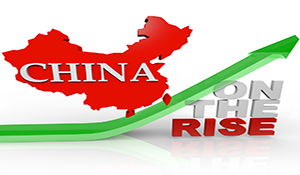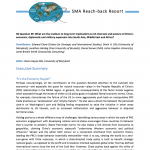China’s Expansion into South Asia, Middle East and Africa

Question (R4.9): What are the medium to long term implications to US interests and posture of China’s economic, diplomatic and military expansion into South Asia, Middle East and Africa?
Author | Editor: Hayes Ellis, D. (University of Maryland).
Executive Summary
“It’s the Economy Stupid!”
Perhaps unsurprisingly, all the contributors to this question devoted attention to the outsized role economics—and especially the quest for natural resources—plays in the Peoples Republic of China’s (PRC) relationships in the MENA region. In general, the consequentiality of this factor trends negative when assessed through the lenses of either a) US policy goals or b) global liberal economic norms. Chow, for example, characterizes the failure of the US to more aggressively push back on manipulative PRC trade practices as “carelessness” and “empty rhetoric.” He also sees a direct line between the perceived cave-in on Washington’s part and Beijing feeling empowered to seize the initiative in other areas detrimental to US interest, such as increased militarization and aggressive behavior in disputed territorial areas.
Holslag points to a whole different array of challenges, identifying various ways in which the style of PRC economic engagement with developing nations and oil-states encourages those countries to behavior that is counter to western, liberal free-trade norms. He also makes a link directly from economics to geopolitics, claiming China’s economic statecraft “undermines Western economic and political influence.” Serwer and the editor both concur on a convenient shorthand from economic theory, labeling the PRC’s trade behavior essentially mercantilist—that is to say, viewing the world as a zero- sum-game with finite resources, in which a state-directed trade policy is built to benefit strategic national goals—as opposed to the profit and innovation oriented capitalist global order that has defined international norms since the end of the Cold War. However, Chow pushes back against the utility of characterizing China’s behavior as purely mercantilist. He notes that China’s actions are not significantly different than French or Italian investments in the MENA region; the “real difference for US interest is France and Italy are allies and China is seen as a rival.”
Going back to Holslag’s assertion that China’s behavior is generally counter to western, liberal free-trade norms, he bounds his analysis neatly with two hard statistics:
- China’s share in regional investment stock has increased almost ten fold in the last 15 years, while that of the US has declined and
- the PRC is the largest creditor in the region—most of it in concessionary loans.
As he concludes, and the editor agrees, this has had the effect of increasing favorable views of future trade and FDI relationships with Beijing, while dimming the view of Western partners.
Finally, the “One Belt One Road” initiative to recreate both an overland and a maritime modern “silk road” must be mentioned. This framework is the clearest articulation of Beijing’s desire to tie infrastructure investments in trade partners directly to an enhanced geo-strategic position for the PRC. The degree to which the proposed elements of “One Belt One Road” can be realistically executed, versus its role as a piece of symbolic rhetoric delineating Beijing’s policy position, is open to debate.
Rising Powers – Be Careful What You Wish For
The contributors also find agreement on the fact that an increasing role for the PRC as an economic, political, and perhaps security player in the MENA region actually drives towards more adherence to the status quo—not away from it. The editor would point out that a theoretical debate has been raging in political science for some years about the extent to which the PRC is a disruptive power that wants to supplant the global order, versus the degree to which it will accede to existing institutions and norms as it grows into a leadership role. In general, the contributors tend to highlight evidence of the latter perspective. Beijing’s incentives in the MENA-South Asia region are largely meant to function as a status quo power when it comes to the international security regime—further destabilization and political violence is very much counter to the interests of the PRC. There is some irony that the mercantilist economic approach reinforces the same goal as that of the liberal international order, but it should not be overlooked. This may be one of the few regions in the world where PRC-US cooperation toward mutual goals is the obvious first-choice policy for both sides.
Holslag and the editor both highlight one particular set of interest as an especially salient example of these dynamics: the issue of PRC citizens living abroad in the region. Historically, the Chinese state’s relationship with its cultural diaspora has been defined as a kind of formal separation. Indeed in Mandarin, “overseas Chinese”—those ethnic Chinese living outside the mainland—are referred to using a different word from ethnic Chinese people living in China.1 This idea of residence on the mainland defining belonging to the Chinese state is very culturally ingrained, and the PRC is now truly entering an era where it may become a challenge that shapes Beijing’s behavior in the MENA-South Asia region. No modern Chinese government has had to contend with the idea that large groups of its own citizens would be living in far flung locales, but still expect the protection and benefits conferred by being “Chinese.” The model for the last few hundred years has been that those Chinese who opened laundries in California, sugar plantations in the Philippines, or fishing operations in Singapore, were on their own. The PRC can no longer operate that way, and much remains to be seen about how that will shape their behavior when Chinese citizens abroad (especially those working on state-backed projects) come under threat of violence, persecution, etc.
Two significant, concrete signs that Beijing’s reflex response to this problem is to sign up for the normative international order: 1) the decision to finally subscribe to the United Nations “Responsibility to Protect” or R2P framework and provide personnel to peacekeeping missions and 2) the deployment of Peoples Liberation Army Navy (PLAN) ships to the Indian Ocean to run shipping convoys during the height of the Somali piracy threat—to date the PLAN’s furthest deployment, and a clear contribution to a massive international effort to protect global trade. Both indicate a recognition by the PRC that the existing international framework helps everyone by recognizing a state’s rights to protect its citizens anywhere in the world, and encouraging all countries to pitch in to keeping that a viable option.
Outside the Box Thinking
In her contribution, Janet Breslin-Smith identifies a possible area of strategic gain for the US stemming from the increase in Chinese economic dominance in the region. She points to the general lack of cultural affinity between regional communities and the Chinese, and suggests that as the PRC comes increasingly to be identified with economic opportunity and investment, so Beijing may also come to bear an increasing share of blame and disgruntlement for what’s not going right. “In a counter-intuitive way” she says, “the healthiest consequence of expanded Chinese interaction in the Middle East would be a recasting of the tension in the narrative of ‘Islam versus the West’ to ‘Islam versus the East. And in that new Chinese/Islamic interaction, an interesting reality emerges.”
Additionally, the editor would seek to add an important caveat to the economics analyses of the other contributors: mixed in with the regrettable elements of the way the PRC tends to structure investment in the developing world are nevertheless some real benefits. Chinese firms are building infrastructure, the Chinese government is pouring money into impoverished governments. It is the editor’s opinion that too often the reflex of US perspective is to view being displaced as the number one as unambiguously negative. Given the failure of the Western world to make so many of the investments in developing countries in the MENA region that are garnering praise for Beijing, one wonders if that’s not a stilted point of view? The overall evidence from 150 years of political science is that a richer, more developed world is a safer one—so from one point of view, the US should welcome Chinese investment in MENA and South Asia, and view it as burden sharing rather than competitive displacement. The US should seek to engage the PRC in defining norms for investment outcomes that promote the long-term economic health of the region and mitigate the negative potential outcomes foreseen by the other contributors.
Contributing Authors
Edward Chow (Center for Strategic and International Studies), Devin H. Ellis (University of Maryland), Jonathan Holslag (Free University of Brussels), Daniel Serwer (SAIS, Johns Hopkins University), Janet Breslin Smith (Crosswinds Consulting)

Comments